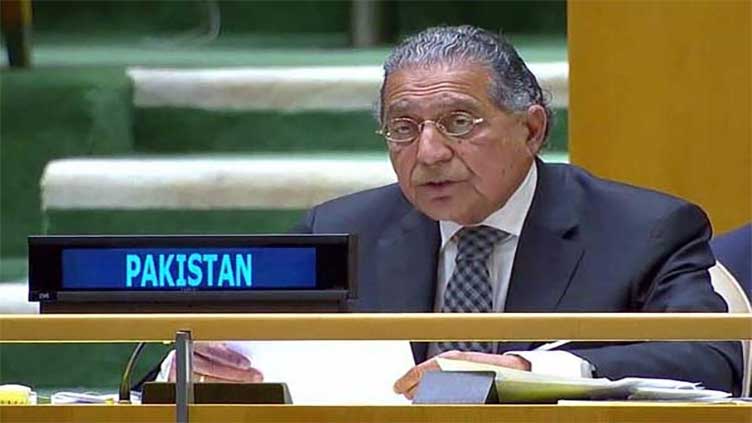Pakistan slams UNSC for closing eyes to Hindutva terrorism

Pakistan
Ambassador Akram says UNSC failed to distinguish between terrorism and legit struggle for freedom
(Web Desk) – Pakistan has called on the UN Security Council to shift some of its focus on combating Al-Qaeda and ISIS to Hindutva groups in India terrorising Muslims as well as on state terrorism brutalising people under occupation, like those in Palestine and Kashmir.
“The Security Council’s work on Counter-Terrorism needs urgent reform,” ambassador Munir Akram, Pakistan’s permanent representative to the UN, told the UN General Assembly, which discussed the annual report of the 15-member Council on its actions to maintain international peace and security.
The Council, he said, had focused on combating Al-Qaeda and ISIS and their associates, while terrorism proliferated across the world.
“The (current) listing and sanctions processes are cumbersome and politicised,” the Pakistani envoy said.
“The Council has also ignored terrorism by extremist and fascist organisations, including the Hindutva groups terrorising Muslims. It has also ignored state terrorism which is used for oppressing and brutalising people under occupation, as in the case of Palestine and Kashmir.
In this regard, ambassador Akram said the Council also failed to distinguish between terrorism and the legitimate struggles of peoples under colonial and alien domination for self-determination.
While awaiting agreement on the reform of the Security Council, the Pakistani envoy said several steps could be taken to improve transparency and accountability in its work, including open discussions allowing inputs by the concerned states and parties following the adoption of Council decisions.
He said the selection and appointment of expert panels and special representatives of the secretary-general should be made transparently with balanced representation from the North and South and various regions.
The Council, the Pakistan envoy added, should set up a body to monitor and facilitate the implementation of its resolutions, including those in abeyance for considerable time, such as those on Palestine and Kashmir.
Expanding the number of non-permanent members was vital to enhancing its representativeness and reducing the dominance of its permanent members, ambassador Akram said.
“Adding new permanent members will erode the principles of sovereign equality and equity and further paralyse the Council,” he insisted.
Opening the debate, the president of the General Assembly, Dennis Francis said what emerges from the Security Council report is “a vivid picture of a world fraught with tension and conflict”.


